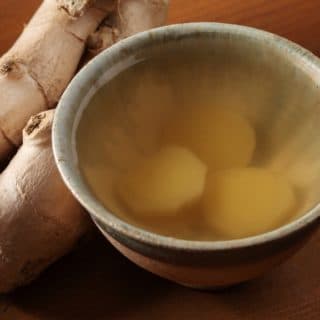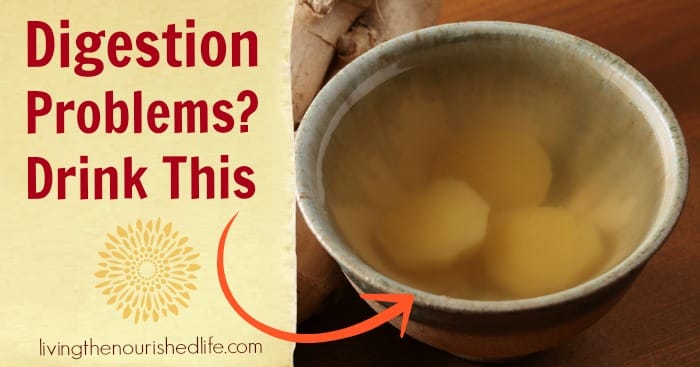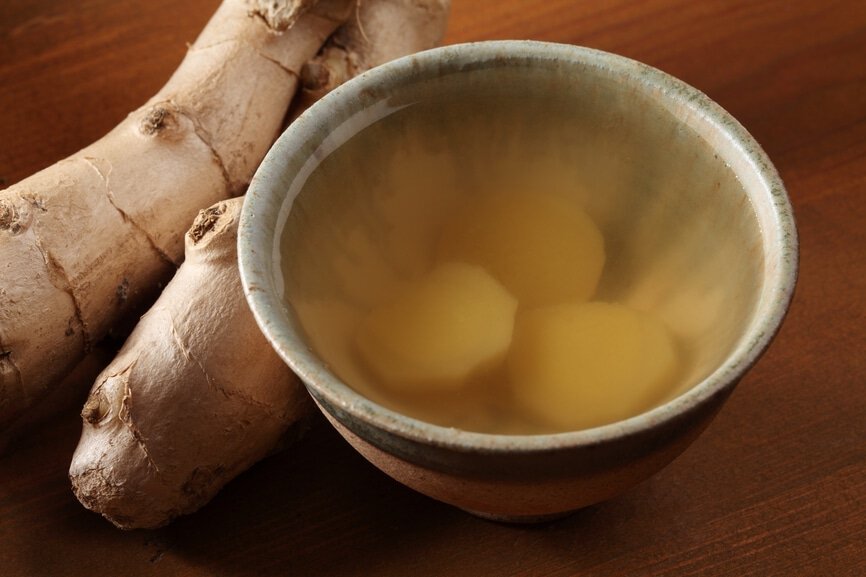This particular drink recipe has helped with my digestion problems in a great way.
Digestion problems… they were rearing their ugly head again. It was so bad, it hurt to eat! And I love eating, so it was becoming a love/hate issue. I love eating, but I hate the way I feel afterward.
I haven’t had any digestive issues in about, say, five years. That’s back when I realized I was following all the wrong health advice. You know, the advice that says fiber bars are super great to eat every day — my stomach is oh-so-glad I stopped that habit!
Since then, I’ve been taking better care of myself in many ways, and my minor digestion problems simply disappeared along the way without me ever really thinking about it.
And then they came back.
Why Digestion Problems? The Root Causes…
I knew why I was having digestion problems. The answer was incredibly simple: stress.
I’ve been under some stress — okay, a heck of a lot of stress — during the past year. I do my best to sleep well and eat well to help support my body during this time, but it started catching up to me. And that’s when the digestion problems started.
What does stress have to do with digestion? A lot actually.
Stress hormones directly affect your digestive health. For starters, stress hormones like cortisol will restrict blood flow to the digestive system — since if you’re being chased by a lion, you need to worry more about blood pumping to your heart, lungs and legs than your stomach.
Of course, we’re not being chased by real lions as much as emotional and mental ones, so these days this biological function often does more harm than good.
But stress affects our digestive health on a deeper level, too:
“Chronic exposure to stress may lead to the development of a variety of gastrointestinal diseases such as gastroesophageal reflux disease (GERD), peptic ulcer disease, IBD, IBS, and even food allergies. (9) Experimental studies have shown that psychological stress slows normal small intestinal transit time, encourages overgrowth of bacteria, and even compromises the intestinal barrier. (10) Chronic stress may therefore play an important role in the development of small intestinal bacterial overgrowth (SIBO) and leaky gut syndrome.” – from Chris Kresser’s article How stress wreaks havoc on your gut – and what to do about it
So my first goal is to continue to find positive ways to cope with stress, reducing stress when possible (though that’s not always available).
Digestion 101: Listen to Your Body
The next step on my journey was to practice what I always preach: listen to my body!
Since my digestive system has become a little more sensitive during the past few months, I noticed that some foods definitely do NOT agree with me! Fiber-rich foods and most vegetables immediately bring my digestion problems to the surface.
It goes against conventional health advice to cut back on these foods, but I know that tuning into your digestive system is important — eating foods that irritate your gut can cause inflammation, which is the last thing a stressed digestive system needs.
So I’m working on getting nutrients from others foods while my body obviously isn’t in the mood for certain things.
Ginger Tea: My Stomach’s New Best Friend
So, while I’m working to reduce stress and avoid a few foods that don’t agree with me right now, I also wanted a natural remedy to help alleviate digestion problems in everyday life.
Funny enough, I’d been craving ginger-flavored everything lately.
It struck me that ginger is actually incredibly supportive of digestive health — in fact, it’s been a natural remedy for digestion problems for ages (ginger has a lot of health benefits actually). Ginger tea is easy to make and quite affordable, so I figured, why make it more complicated than that?
Ginger has been a lifesaver in the past couple of weeks for me! I try to drink my ginger tea at least twice a day, and especially after heavy meals. Bloating, stomach pains, gas… all those icky symptoms of digestion problems drastically improved within a couple of days.
I would say this step alone has eliminated about 80% of my symptoms. Nice, right?
As a side benefit, ginger seems to have a warming effect: my hands and feet have been staying toasty warm even when there’s a winter chill in the air!
Alternatives to Fresh Ginger Tea
I’m realistic, though. Not everyone (including me!) feels like making fresh ginger tea all the time. So if you’re in a pinch, try one of these easy methods instead:
If you try this recipe, please rate it below and share it so your friends can enjoy it too! For more of my recipes, remedies, and lifestyle tips, follow me on Facebook, Instagram, and Pinterest.

Fresh Ginger Tea for Digestion Problems
Ingredients
- 1 tablespoon fresh grated or thinly sliced ginger
- 2 cups filtered water
- 1 tablespoon raw honey
- 1 tablespoon lemon juice
Instructions
- Peel your fresh ginger root, slice or grate until you have about a tablespoon.
- Bring water to a boil and pour over your ginger in a bowl or cup.
- Cover and steep for about 10 minutes.
- Add honey and lemon if desired and enjoy!
Notes
- When you finely grate the ginger, it released more flavor and benefits into your tea.
- If you can't get fresh ginger, use 1/2 teaspoon of ground ginger per cup if desired.
More Natural Remedy Recipes:
- Homemade Cough Syrup Recipe
- Homemade Pedialyte Recipe with Fruit Juice
- Why You Should Drink Bamboo Leaf Tea
- Weird Home Remedy for Pink Eye



